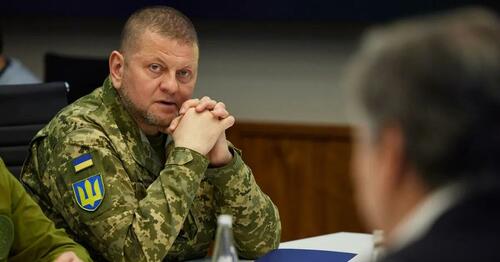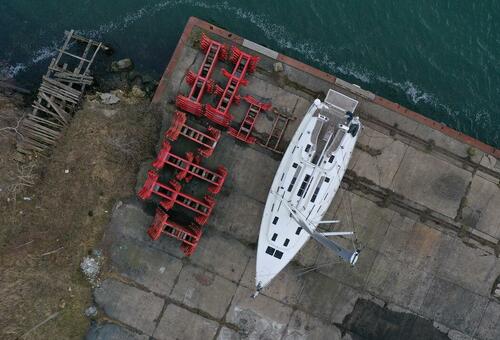
A fresh Wall Street Journal investigative report purports to finally provide the "real story" on the Nord Stream pipeline sabotage which happened nearly two years ago, and has since resulted in a series of seeming endless theories and speculation. After as we previously detailed Germany has issued its first arrest warrant in the case amid a lengthy investigation, the WSJ unveils a fantastical sounding tale which began among Ukrainian senior officers and businessmen over drinks one night early in the war.
The new WSJ reporting weaves a narrative that essentially focuses on a rogue general who ultimately defied efforts by President Zelensky and the CIA to reign him in. "Ukrainian President Volodymyr Zelensky initially approved the plan, according to one officer who participated and three people familiar with it. But later, when the CIA learned of it and asked the Ukrainian president to pull the plug, he ordered a halt, those people said," the report says.
We are told that Zelensky’s since fired commander-in-chief of the armed forces, Valeriy Zaluzhniy, still moved ahead with a high risk plan funded by businessmen to the tune of $300,000 and involving a rented yacht with a six-member crew which included experienced civilian divers.

The scheme was dubbed a "public-private" partnership as it involved military officers reportedly being financed from these private sector sources. Some top Ukrainian special-operations officers were recruited, and the crew set out "armed only with diving equipment, satellite navigation, a portable sonar and open-source maps of the seabed charting the position of the pipelines."
They used a powerful explosive called HMX and timer-controlled detonators, the account says. WSJ described that once the plan was set in motion, the team went incommunicado and thus Zelensky's supposed desperate efforts to call off the operation couldn't be conveyed. Again, the whole narrative appears crafted to exculpate Zelensky and the CIA. A key section of the WSJ report reads as follows:
Within days, Zelensky approved the plan, according to the four people familiar with the plot. All arrangements were made verbally, leaving no paper trail.
But the next month, the Dutch military intelligence agency MIVD learned of the plot and warned the CIA, according to several people familiar with the Dutch report. U.S. officials then promptly informed Germany, according to U.S. and German officials.
The CIA warned Zelensky’s office to stop the operation, U.S. officials said. The Ukrainian president then ordered Zalyzhniy to halt it, according to Ukrainian officers and officials familiar with the conversation as well as Western intelligence officials. But the general ignored the order, and his team modified the original plan, these people said.
The CIA also just days after the bombing in late Sept. 2022 was able to provide European allied intelligence agencies a detailed report of how the covert operation went down, the WSJ story says. According to more from the report, German investigators were later able to identify the boat and thus gain valuable evidence:
They had one lucky break. In rushing to leave Germany, the sabotage crew neglected to wash the Andromeda, allowing German detectives to find traces of explosives, fingerprints and DNA samples of the crew.
Investigators later identified their mobile phone numbers and their Iridium satellite phone. That data allowed them to reconstruct the entire journey of the boat, which moored in Germany, Denmark, Sweden and Poland. U.S. authorities sought a court order to obtain from Google the emails a Ukrainian businessman used to lease the boat, and handed them over to the Germans. That Ukrainian businessman had contacted a number of boat rental firms in Sweden as well as in Germany, starting from mid-May 2022.
Investigators then analyzed all mobile phone traffic in the areas where the boat was located, trawling through thousands of connections to distill the relevant data.
We are then told that the German investigation has been unable to link President Zelensky directly to the operation and is now focused on former General Zalazhniy and his aides (Zaluzhniy is now the Ukrainian ambassador to the UK).

The report also includes the key admission that allies of Kiev have this whole time had incentive to hide, withhold, or cover-up information that arises from the investigation: "The findings could upend relations between Kyiv and Berlin, which has provided much of the financing and military equipment to Ukraine, second only to the U.S. Some German political leaders may have been willing to overlook evidence pointing to Ukraine for fear of undermining domestic support for the war effort."
Indeed this high level blame-game in the aftermath of recent findings being made public is already beginning:
The former head of German intelligence says that there was an “agreement” between Ukrainian President Volodymyr Zelensky and the President of Poland to carry out the attack on the Nord Stream Pipelines.
...Much of the legacy media initially blamed Russia for attack, claiming it was a false flag but offering no sensible reason as to why Moscow would target its own energy infrastructure.
However, during an appearance on German broadcaster WELT-TV, August Hanning, who served as the head of Germany’s Federal Intelligence Service (BND) from 1998 to 2005, the attack was carried out at the behest of Zelensky and Andrzej Duda.
Meanwhile, in reaction to the flurry of new reporting this week on the German investigation the Ukrainian presidency's office has issued a fresh statement vehemently denying the government's involvement in the pipeline blasts.
Ukrainian presidential adviser Mykhailo Podolyak told Reuters that "Such an act can only be carried out with extensive technical and financial resources … and who possessed all this at the time of the bombing? Only Russia."
So the official version of the Nord Stream bombing (as per yesterday’s WaPo article) now is that Zelenskyy himself ordered Valerii Zaluzhnyi, former Commander-in-Chief of the Armed Forces of Ukraine, to carry out the bombing — and that the CIA tried to stop them but the… pic.twitter.com/KnI8decBJr
— Thomas Fazi (@battleforeurope) August 15, 2024
But contrast this with some of the statements in the fresh WSJ report. It cited one Ukrainian officer who was involved in the plot as saying, "I always laugh when I read media speculation about some huge operation involving secret services, submarines, drones and satellites." The officer continued, "The whole thing was born out of a night of heavy boozing and the iron determination of a handful of people who had the guts to risk their lives for their country."
Many readers of the fresh WSJ account remain high skeptical to say the least...
Couple dudes got wasted, rented a boat, and blew up Nord Stream.
— George Gammon (@GeorgeGammon) August 15, 2024
This is LOL absurd…
Maybe more absurd than “safe and effective.”
At this point the global elite are just playing a game of “let’s see how ridiculous a story we can get people to believe.” pic.twitter.com/ZFrHFLtfwS
The following questions still remain: Was it the CIA, as famed journalist and Pulitzer prize winner Seymour Hersh claimed? Was it a Ukrainian team of commandos with a sailing yacht? Or was it a high-level op approved by the top leadership of Ukraine and Poland, with knowledge of American intelligence?
A fresh Wall Street Journal investigative report purports to finally provide the “real story” on the Nord Stream pipeline sabotage which happened nearly two years ago, and has since resulted in a series of seeming endless theories and speculation. After as we previously detailed Germany has issued its first arrest warrant in the case amid a lengthy investigation, the WSJ unveils a fantastical sounding tale which began among Ukrainian senior officers and businessmen over drinks one night early in the war.
The new WSJ reporting weaves a narrative that essentially focuses on a rogue general who ultimately defied efforts by President Zelensky and the CIA to reign him in. “Ukrainian President Volodymyr Zelensky initially approved the plan, according to one officer who participated and three people familiar with it. But later, when the CIA learned of it and asked the Ukrainian president to pull the plug, he ordered a halt, those people said,” the report says.
We are told that Zelensky’s since fired commander-in-chief of the armed forces, Valeriy Zaluzhniy, still moved ahead with a high risk plan funded by businessmen to the tune of $300,000 and involving a rented yacht with a six-member crew which included experienced civilian divers.

The scheme was dubbed a “public-private” partnership as it involved military officers reportedly being financed from these private sector sources. Some top Ukrainian special-operations officers were recruited, and the crew set out “armed only with diving equipment, satellite navigation, a portable sonar and open-source maps of the seabed charting the position of the pipelines.”
They used a powerful explosive called HMX and timer-controlled detonators, the account says. WSJ described that once the plan was set in motion, the team went incommunicado and thus Zelensky’s supposed desperate efforts to call off the operation couldn’t be conveyed. Again, the whole narrative appears crafted to exculpate Zelensky and the CIA. A key section of the WSJ report reads as follows:
Within days, Zelensky approved the plan, according to the four people familiar with the plot. All arrangements were made verbally, leaving no paper trail.
But the next month, the Dutch military intelligence agency MIVD learned of the plot and warned the CIA, according to several people familiar with the Dutch report. U.S. officials then promptly informed Germany, according to U.S. and German officials.
The CIA warned Zelensky’s office to stop the operation, U.S. officials said. The Ukrainian president then ordered Zalyzhniy to halt it, according to Ukrainian officers and officials familiar with the conversation as well as Western intelligence officials. But the general ignored the order, and his team modified the original plan, these people said.
The CIA also just days after the bombing in late Sept. 2022 was able to provide European allied intelligence agencies a detailed report of how the covert operation went down, the WSJ story says. According to more from the report, German investigators were later able to identify the boat and thus gain valuable evidence:
They had one lucky break. In rushing to leave Germany, the sabotage crew neglected to wash the Andromeda, allowing German detectives to find traces of explosives, fingerprints and DNA samples of the crew.
Investigators later identified their mobile phone numbers and their Iridium satellite phone. That data allowed them to reconstruct the entire journey of the boat, which moored in Germany, Denmark, Sweden and Poland. U.S. authorities sought a court order to obtain from Google the emails a Ukrainian businessman used to lease the boat, and handed them over to the Germans. That Ukrainian businessman had contacted a number of boat rental firms in Sweden as well as in Germany, starting from mid-May 2022.
Investigators then analyzed all mobile phone traffic in the areas where the boat was located, trawling through thousands of connections to distill the relevant data.
We are then told that the German investigation has been unable to link President Zelensky directly to the operation and is now focused on former General Zalazhniy and his aides (Zaluzhniy is now the Ukrainian ambassador to the UK).

The report also includes the key admission that allies of Kiev have this whole time had incentive to hide, withhold, or cover-up information that arises from the investigation: “The findings could upend relations between Kyiv and Berlin, which has provided much of the financing and military equipment to Ukraine, second only to the U.S. Some German political leaders may have been willing to overlook evidence pointing to Ukraine for fear of undermining domestic support for the war effort.”
Indeed this high level blame-game in the aftermath of recent findings being made public is already beginning:
The former head of German intelligence says that there was an “agreement” between Ukrainian President Volodymyr Zelensky and the President of Poland to carry out the attack on the Nord Stream Pipelines.
…Much of the legacy media initially blamed Russia for attack, claiming it was a false flag but offering no sensible reason as to why Moscow would target its own energy infrastructure.
However, during an appearance on German broadcaster WELT-TV, August Hanning, who served as the head of Germany’s Federal Intelligence Service (BND) from 1998 to 2005, the attack was carried out at the behest of Zelensky and Andrzej Duda.
Meanwhile, in reaction to the flurry of new reporting this week on the German investigation the Ukrainian presidency’s office has issued a fresh statement vehemently denying the government’s involvement in the pipeline blasts.
Ukrainian presidential adviser Mykhailo Podolyak told Reuters that “Such an act can only be carried out with extensive technical and financial resources … and who possessed all this at the time of the bombing? Only Russia.”
So the official version of the Nord Stream bombing (as per yesterday’s WaPo article) now is that Zelenskyy himself ordered Valerii Zaluzhnyi, former Commander-in-Chief of the Armed Forces of Ukraine, to carry out the bombing — and that the CIA tried to stop them but the… pic.twitter.com/KnI8decBJr
— Thomas Fazi (@battleforeurope) August 15, 2024
But contrast this with some of the statements in the fresh WSJ report. It cited one Ukrainian officer who was involved in the plot as saying, “I always laugh when I read media speculation about some huge operation involving secret services, submarines, drones and satellites.” The officer continued, “The whole thing was born out of a night of heavy boozing and the iron determination of a handful of people who had the guts to risk their lives for their country.”
Many readers of the fresh WSJ account remain high skeptical to say the least…
Couple dudes got wasted, rented a boat, and blew up Nord Stream.
This is LOL absurd…
Maybe more absurd than “safe and effective.”
At this point the global elite are just playing a game of “let’s see how ridiculous a story we can get people to believe.” pic.twitter.com/ZFrHFLtfwS
— George Gammon (@GeorgeGammon) August 15, 2024
The following questions still remain: Was it the CIA, as famed journalist and Pulitzer prize winner Seymour Hersh claimed? Was it a Ukrainian team of commandos with a sailing yacht? Or was it a high-level op approved by the top leadership of Ukraine and Poland, with knowledge of American intelligence?
Loading…





